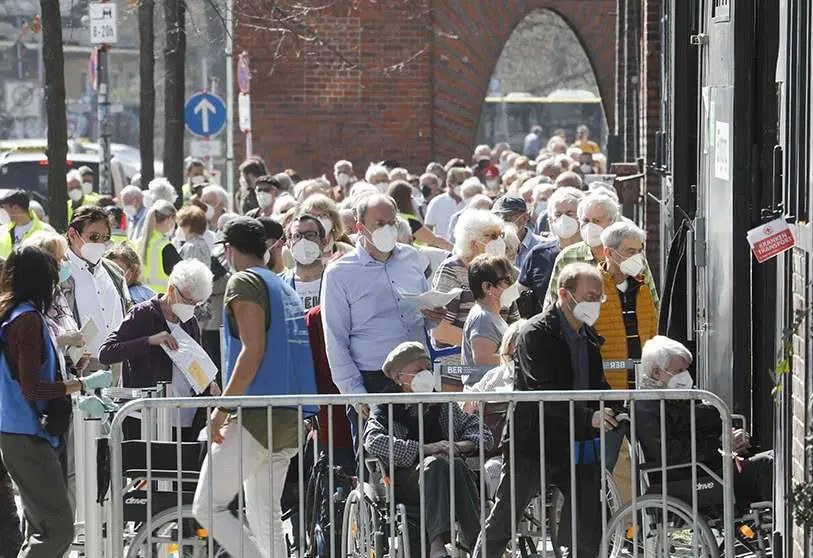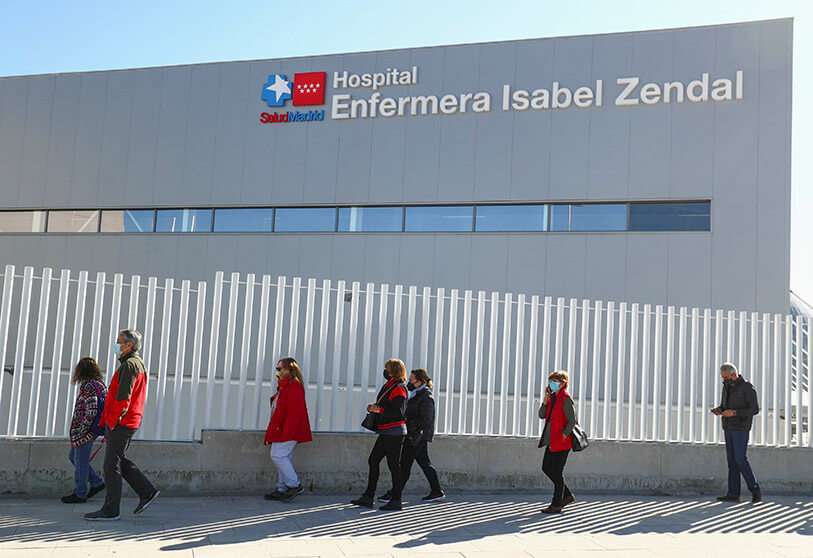Europe in the light-dark: health and pandemic

When this situation began, for which no one was prepared, even though there were some indicators that suggested that some of this might happen, we realised that the virus does not understand borders, gender, age or social class. Belonging to more or less socially or financially healthy countries seemed, according to the optimism shown at the beginning of 2020 by the ministers of the 26, that we were prepared, that we would be able to overcome this without major problems, that the health systems were so solid and efficient that we could even afford to help less developed countries...
A few months later, Europe was in the midst of the biggest health crisis we had encountered since the wars, one of the biggest challenges we would ever face, with hospitals collapsed, the population totally confined, health workers exhausted and a frantic race, as never before known in history, to find in record time a treatment that would stop the cascade of people affected and dying, and a vaccine that would protect us from that tiny particle 900 times smaller than the diameter of a human hair, which had been capable of altering life in the world as we knew it and which had demonstrated our fragility as an environment and as human beings, even though history had already shown us how entire civilisations had been destroyed or had disappeared in previous pandemics. The reality is that today, in the century of technology and the most important medical advances in the history of humanity, we are still vulnerable and we still have to reflect on what we are doing wrong when we have been unable to prevent a significant part of our populations from dying alone, without help and without comfort, and their families have not been able to mourn what was physically and psychologically necessary.

There, in the midst of this gigantic challenge, never before known to our generation, we realised that our beloved Europe, with few exceptions, thanks to the short-sightedness of some leaders and the lack of foresight of others, had lowered its alert levels, had ceased to consider public health as an absolute priority, had reduced the budgets dedicated to health, had stopped producing and stocking sufficient personal protection products, respirators and emergency equipment, and some of them with more populist than scientific overtones, They even allowed themselves to criticise the excessive "alarmism" of experts who warned of what could happen, following a path that was being set at the time, from other parts of the world, forgetting that decision-making in a situation of this type should obey exclusively to criteria based on the scientific evidence offered by the most qualified technicians and not by some who woke up one day anointed by the gods of knowledge and decided to take the measures that their supine ignorance led them to believe were the right thing to do. Fortunately, in Europe we did not suffer in all its crudeness from this scourge that was suffered in other parts of the world, although the actions of some governments were clearly improvable.
But this mixture of uncertainty, haste and sometimes incompetence, placed us at the mercy of a world market where, as if it were a souk, whoever arrived first and with a ready wallet could change the delivery address of a plane loaded with materials destined for a country, upon payment of a larger sum of money than the original recipient, developing in the process and sometimes in an unsubtle way a real geostrategic war of supremacy between established powers and emerging powers.

But let us be fair. It is not all criticism, because once the initial imbalances were overcome, thanks to the EU, we were able to receive the centralised aid that was acquired in all countries, and, thanks to the EU's gigantic economic effort, it was possible to increase the research resources that made it possible for some vaccines to be developed, produced and distributed equally among all the Member States. Now the best, fairest and most efficient way of recognising vaccinated people is being decided, through a European vaccination passport, also called a digital green certificate. This, in my opinion, is not at all a discriminatory factor, as has been said in some quarters. Vaccination is currently the only way to get out of this health, social and economic crisis caused by the pandemic in a reasonable time and it is only fair to recognise and facilitate the movement of those who have decided in solidarity to be vaccinated, for themselves and for their fellow citizens, and all the more so when the vaccine is free and available to all the citizens of the Union.
A different matter is that the speed of administration varies from country to country, and this is a conditioning factor that we must try to minimise so that the equality between Europeans that we can boast of becomes a reality and not an unfulfilled wish.
To elaborate on this point, vaccination passports have existed for years and nobody has ever complained about them, because they prevented the possibility of being affected by endemic infectious diseases, as was the case with smallpox, or is still the case with yellow fever, with sporadic endemic outbreaks, or other infections. It would also be different if mobility between countries enshrined in the EU treaties were affected because there are vaccinated and unvaccinated citizens and the latter were prevented from travelling altogether. This is neither the idea nor the policy of the EU, but it does seem reasonable that those who have not been immunised because it is not yet their turn to receive the vaccine because of their age group or because they have refused to receive it should be subject to certain very specific restrictive measures, while preserving their rights, in order to protect the rest of the inhabitants of the country in question.

There is no doubt that increasing cooperation between EU countries, and further promoting European solidarity, can be key elements in bringing the citizens of the member states together, and in fighting the common goal of defeating the pandemic.
There are some lessons to be learned from this pandemic, and they boil down to three key points. The first is that you can never cut back on health. The consequences of such cuts are paid for in deaths. Nor can you cut back on educational opportunities. It is essential that children and adolescents of all places and economic conditions have access to continuing education that does not depend on the technical or financial capacities of their parents, and this is what the authors of a manifesto calling for the internet to be considered a protected good with universal access wanted to highlight. The third conclusion is that basic and applied research must be strongly and much more significantly promoted. It has been proven that countries with consolidated research and with significant contributions to their GDP are the ones that have managed to make the greatest and fastest progress.

Every crisis creates an opportunity. Let us hope that this one will help us, as citizens of the European Union, to think more and better about the "we", individually and collectively, instead of the usual "I".
José Ramón Calvo, Doctor of Medicine, President of the Institute for International Cooperation of the Royal European Academy of Doctors and member of the Scientific Council of Citizens pro Europe.
